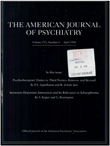Initial reliability and validity of a new retrospective measure of child abuse and neglect
Abstract
OBJECTIVE: This report presents initial findings on the reliability and validity of a new retrospective measure of child abuse and neglect, the Childhood Trauma Questionnaire. METHOD: Two hundred eighty-six drug- or alcohol-dependent patients were given the Childhood Trauma Questionnaire as part of a larger test battery, and 40 of these patients were given the questionnaire again after an interval of 2 to 6 months. Sixty-eight of the patients were also given a structured interview for child abuse and neglect, the Childhood Trauma Interview, that was developed by the authors. RESULTS: Principal-components analysis of responses on the Childhood Trauma Questionnaire yielded four rotated orthogonal factors: physical and emotional abuse, emotional neglect, sexual abuse, and physical neglect. Cronbach's alpha for the factors ranged from 0.79 to 0.94, indicating high internal consistency. The Childhood Trauma Questionnaire also demonstrated good test-retest reliability over a 2- to 6-month interval (intraclass correlation = 0.88), as well as convergence with the Childhood Trauma Interview, indicating that patients' reports of child abuse and neglect based on the Childhood Trauma Questionnaire were highly stable, both over time and across type of instruments. CONCLUSIONS: These findings provide strong initial support for the reliability and validity of the Childhood Trauma Questionnaire.
Access content
To read the fulltext, please use one of the options below to sign in or purchase access.- Personal login
- Institutional Login
- Sign in via OpenAthens
- Register for access
-
Please login/register if you wish to pair your device and check access availability.
Not a subscriber?
PsychiatryOnline subscription options offer access to the DSM-5 library, books, journals, CME, and patient resources. This all-in-one virtual library provides psychiatrists and mental health professionals with key resources for diagnosis, treatment, research, and professional development.
Need more help? PsychiatryOnline Customer Service may be reached by emailing [email protected] or by calling 800-368-5777 (in the U.S.) or 703-907-7322 (outside the U.S.).



